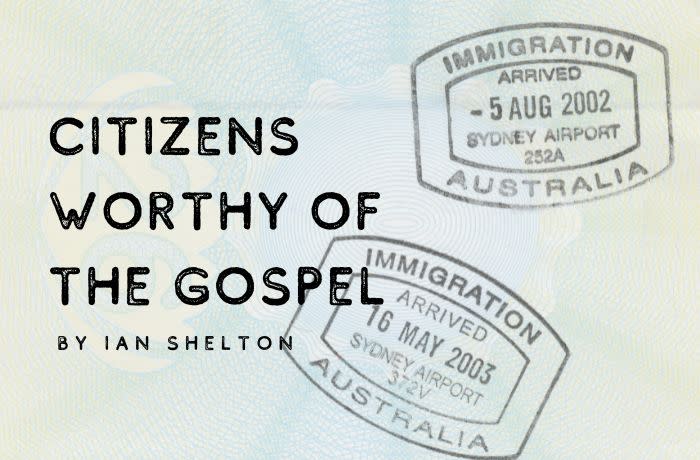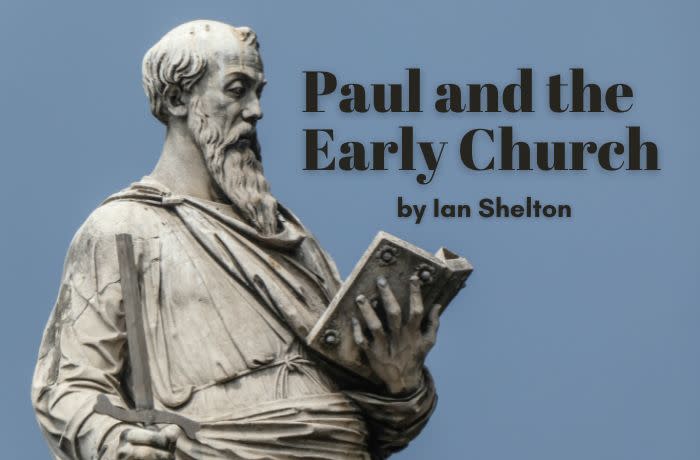Download our vision book
As we move on through The Bible we look at the letters or epistles. They are full of wonderful theology explaining the work of Christ and His church. I will look at a few areas only emphasising the human side of the letters. They are written to people who lived and worked in the world of the day. Each letter needs to be read in its context while considering the issues people faced as they sought to live for Christ, as His church, in a dark and challenging environment.
Most of the letters were written to christians living in the cities of the mighty Roman Empire, the greatest of all empires. These fledgling churches, though few in number, joyfully embraced their mandate to live as a counter cultural community preaching the good news of Jesus in word and by good deeds. Even persecution did not deter them but as a later church father was reported to have said, “The blood of martyrs is the seed of the church.” (Tertullian 197AD) There are many stirring stories of the early Christians going bravely to their death witnessing for Christ to the end.
They did not remain behind the four walls of their church meeting place but rather lived in full view of their watching neighbours. In times of plagues or poverty the christians were the ones who stepped forward to assist. Another early church father, Cyprian, urged christians to love their pagan neighbours by visiting them, providing bread and water to them and to pray for their salvation even when persecuted by them. In the face of a terrible plague in the city of Carthage in 251 AD, Cyprian urged the christians not to flee to the hills to escape the plague as many in the city did but to remain and care for their own sick as well as their pagan neighbours. Even though many christians caught the plague and died it is said, in the long run, this care greatly increased the number of christians.
How did God rebuild and restore broken humanity? The answer is through the church that lived as salt and light in the wider community. Their humility, unity and servanthood included all as equals as they went forth meeting needs and transforming their communities through the good news of Jesus. Over time they started hospitals and schools and did many good works that benefited the wider city. They ministered to the poor, included the migrants and refugees, challenged injustice, treated women as equals and loved their enemies. These were unheard of qualities in the pagan Roman world.
The world had never seen anything like it. The Kingdom of God had come, and the cities of the empire were beginning to experience something of the blessing of the heavenly city. Though never perfect, in weakness with many faltering steps, the church of Jesus grew and brought a new sense of flourishing to humanity.
The restoration of all things spoken by the prophets (Acts 3:21) was beginning to happen as this baby church went forth into city after city.
“You will be known as Repairers of the Cities and Restorers of Communities.” Is. 58:12b TPT
The lives they lived in the cities of the Empire was the stand out feature of these early christians. The same should be for us today. While there are many good works being done in our cities by various churches, something is missing as our communities experience more and more brokenness and pain.
We will briefly look at portions from some of the epistles to learn from these early christians. Remember these letters are more than theological statements for us to study, they are personal letters written by leaders who knew and loved the people they were writing to. Many names are scattered through the various letters. It is worthwhile considering who these people were and what were the conditions and culture of the cities they lived and worked in.
As the unity of the church grew in our city during the 1990’s it was a great joy to begin to meet christians from the various churches who involved themselves in the many combined efforts to reach the wider city. These wonderful people were excited to see the unity that their pastors were encouraging and to be able to contribute to the transformation of our city. Pastors were also excited to see their people working together with other christians for the Kingdom of God in the city. They willingly encouraged and released their people into these combined efforts.
The release, equipping and empowering of the people of God in your city into their respective ministries is the key to the Kingdom transformation of your city through the gospel. This is the role of the church leaders.
I have often felt that my ministry is to do all I can to assist others to flourish in their ministries.
ROMANS
When we come to this amazing letter penned by Paul, the opening verses set the scene. He is writing to a church he is yet to visit. Some say it had less than 200 people at the time of writing. Others suggest it could have been only a few dozen.
This small church was an outpost of heaven planted in the midst of the most powerful city of the day. Rome ruled much of the known world, worshipped many gods including Caesar himself who claimed divinity. Roman so called justice and peace was unrelenting and ruthless. Peace came at the price of total oppressive obedience. All of this was enforced by the greatest army the world had ever seen. The Roman emperor had been enthroned as the “lord of the world,” designated “son of god”. The emperor's “gospel” was the announcement of his military victories.
Paul takes this Roman script, using the same words that Caesar applies to himself, applies them to Jesus and to this small, seemingly insignificant church. Paul was totally counter cultural and as others have said, counter imperial.
Let’s look at how Paul begins his letter to the Christian’s of Rome.
“Paul, a servant of Christ Jesus, called to be an apostle, set apart for the gospel of God, which he promised beforehand through his prophets in the holy Scriptures, concerning his Son, who was descended from David according to the flesh and was declared to be the Son of God in power according to the Spirit of holiness by his resurrection from the dead, Jesus Christ our Lord, through whom we have received grace and apostleship to bring about the obedience of faith for the sake of his name among all the nations, including you who are called to belong to Jesus Christ. To all those in Rome who are loved by God and called to be saints: Grace to you and peace from God our Father and the Lord Jesus Christ.
First, I thank my God through Jesus Christ for all of you, because your faith is proclaimed in all the world.” (Rom. 1:1-8 ESV)
Paul effectively was saying that he, Paul, was a “servant/slave to Christ Jesus” not to Caesar. The word “Christ” meant that Jesus was the only Messiah who was the world's true Lord, not Caesar. To say that the “gospel” is God’s good news was to say that Caesar’s so-called military victories were not the good news. Paul goes on to say that “Jesus Christ our Lord” was the “Son of God” and not Caesar who had this title inscribed on Roman coins of himself.
What’s more, this amazing good news of Jesus was going to “all the nations” according to Paul. The fruit of the gospel was grace and peace from “God our Father and the Lord Jesus Christ.” Paul was saying to this small group that the real authority for the nations lay with them as they proclaimed the gospel, and not with the might of the Roman Empire and their so-called divine Caesar who claimed he was the “father” and “saviour of the world.” He claimed that in the face of a Roman sword all should bow down to him to experience Roman “justice and peace.”
This indeed was a counter story and left no doubt in the minds of the hearers who they worshipped and that He was mandating His people to take the gospel not only to Rome but to the nations. Their identity and purpose was clear.
All of this was of course treasonous and worthy of death under Roman law.
I wonder what this fledgling and seemingly insignificant church in the world's greatest city, known for its brutal conquests, would have thought as they sat on their benches listening to an elder read this letter from a far off “apostle.”
My first reaction might have been, “Paul, are you trying to get us all killed!” Then I might have suggested, “Let’s have a church council meeting to decide how we destroy this letter and distance ourselves from Paul.”
There was none of that as Paul, in these opening verses, declared his mission was to “all the nations,” then went on to say how this church in Rome was already known abroad as travelling people spoke of the great faith of this church that lived and worked in the shadow of Imperial might.
It would be an interesting exercise for Christians in a city to consider how Paul might have introduced a letter if he had written in this modern day. Would our faith in the light of an increasingly anti Christian culture stand out for Jesus Christ our Lord?
Paul goes on to say in this letter to the church in Rome that the gospel unveils God’s righteousness and justice not only for Rome but for the whole world. Jesus who was crucified and rose again to be enthroned in heaven is now the world's true Lord who through His church would bring this good news to all.
Again to repeat, Jesus is the Lord of each of our cities and towns and not a Satanically inspired injustice that oppresses, divides and brings violence and chaos to society.
Romans goes on to say that the whole world, all of creation, is now in sight as God’s “holy land” not only Israel but of course including Israel (Rom. 4:13; 8:18-25). All nations became the focus of the good news and the mission field for the church. As in the Old Testament the land was subdued (inherited) city by city, so now for the world the early Christians’ strategy was still cities.
In the mid 1980’s I came to see that God’s strategy to reach nations was city by city. This was a “light bulb” moment for me. In my excitement I took this “revelation” to my then senior pastor who was not interested in the slightest. However after some years of church crisis and personal pain God began to open my eyes to what He was doing in cities around the world. I began to meet other leaders from many nations who had the same vision, plus books began to appear on the subject of cities.
In the early nineties I had the joy, with another local pastor, of going to Argentina to witness first hand the city wide revivals that were under way there. I was amazed as I saw the fruit of revival with thousands who had come to know the Lord. Cities were being impacted. One of the chief take always was a practical teaching on the nature of spiritual warfare needed to loose the bonds of darkness in a city as the gospel went forth. To see how the enemy controlled a city was a new concept to me. But what a joy to see how the gospel could liberate a city!
Even to this day many Christians in our own city would be unaware of the intense spiritual warfare that was conducted by a dedicated group of intercessors and pastors. I look back on those days and see that season contributing to the many blessings that our city has experienced over the years.
Globally the work of God in cities has accelerated to the place where now thousands of cities covering every continent have at least some christians who are conscious of their call to the gospel and the city.
ROMANS 8
Read Romans 8:15-39.
I feel reluctant to even comment on this amazing chapter and yet it expresses the very heart of God for His family to engage with the pain of creation. So I will briefly comment.
Our “Abba Father” has adopted us as His children into His family as co-heirs and co-sufferers to be co-glorified with Christ. From this covenantal partnership the Father’s family is to take on the pain and suffering of a creation longing for something better.
The deep unrelenting pain in our world, including in our cities, is manifested by the continual groaning of creation. The Father’s family, sensing something better, enters into the pain and groaning of creation only to discover the Spirit is also groaning as He intercedes for us, helping us in our weakness.
Miracles happen when the groaning of God’s children and the groaning of creation aligns with the groaning intercession of the Spirit.
In Romans 8 after this intercession for the pain in creation comes the well known and often quoted verse 28.
“And we know that God causes all things to work together for good to those who love God, to those who are called according to His purpose.” (NASB)
Haley Jacob in her book, Conformed to the Image of His Son, suggests that a better translation is, “In all things God works for good with those who love God, who are called according to His purpose.”
Haley goes on to say that “the good that is done is not for the believer but is done by God and the believer on behalf of all things.” (Page 249)
This makes so much more sense in the context of the chapter as the Father adopts a family to bring healing to a creation in pain.
I have seen this in our city as hundreds of abused girls discovered the healing love of Jesus. I have seen this in Fiji where whole villages, including the environment, were healed in the love of Jesus.
Haley Jacob’s whole book is brilliantly centred on the exegesis of this one phase in Romans 8:29, ie., the Father’s purpose for His children from verse 28 is to be “confirmed to the image of His Son.”
Haley Jacob, along with a growing number of authors, are helping the church to refocus on Jesus and His purpose for the world and away from a self centred view of gospel blessings being chiefly for “my benefit.”
Haley concludes her book with this paragraph,
“I return my reader to one of the key questions of this book: What is the goal of salvation? For too long, scholars and laymen alike have myopically viewed justification and salvation as ends in themselves, whether for the benefit of the individual or of the incorporative body of Christ. The goal of salvation is believer’s conformity to the Son of God-their participation in his rule over creation as God’s eschatological family and as renewed humanity-but only and always with the purpose of extending God’s hand of mercy, love, and care to the wider creation. This was humanity’s job in the beginning: it will be the believer's responsibility and honour in the future; it is God’s purpose in calling his people in the present.” (Page 266)
This sums up well what it is to be “like Christ.” If Christians in every city took this delegated role of ruling with Jesus for the benefit of the city, then what amazing things could God do?
The final verses of Romans 8 as seen in verses 31-39 are power packed reminders of the amazing and never ending depth and width of His love that no matter what, causes His people to “overwhelmingly conquer through Him who loved us.”
For a good summary of Romans 8 read chapter 10 of Tom Wright’s book, The Crown and the Fire.”
"There's nothing more radical, nothing more revolutionary, nothing more subversive against injustice and oppression than The Bible," Archbishop Desmond Tutu.
By Ian Shelton Coordinator of Movement Australia



